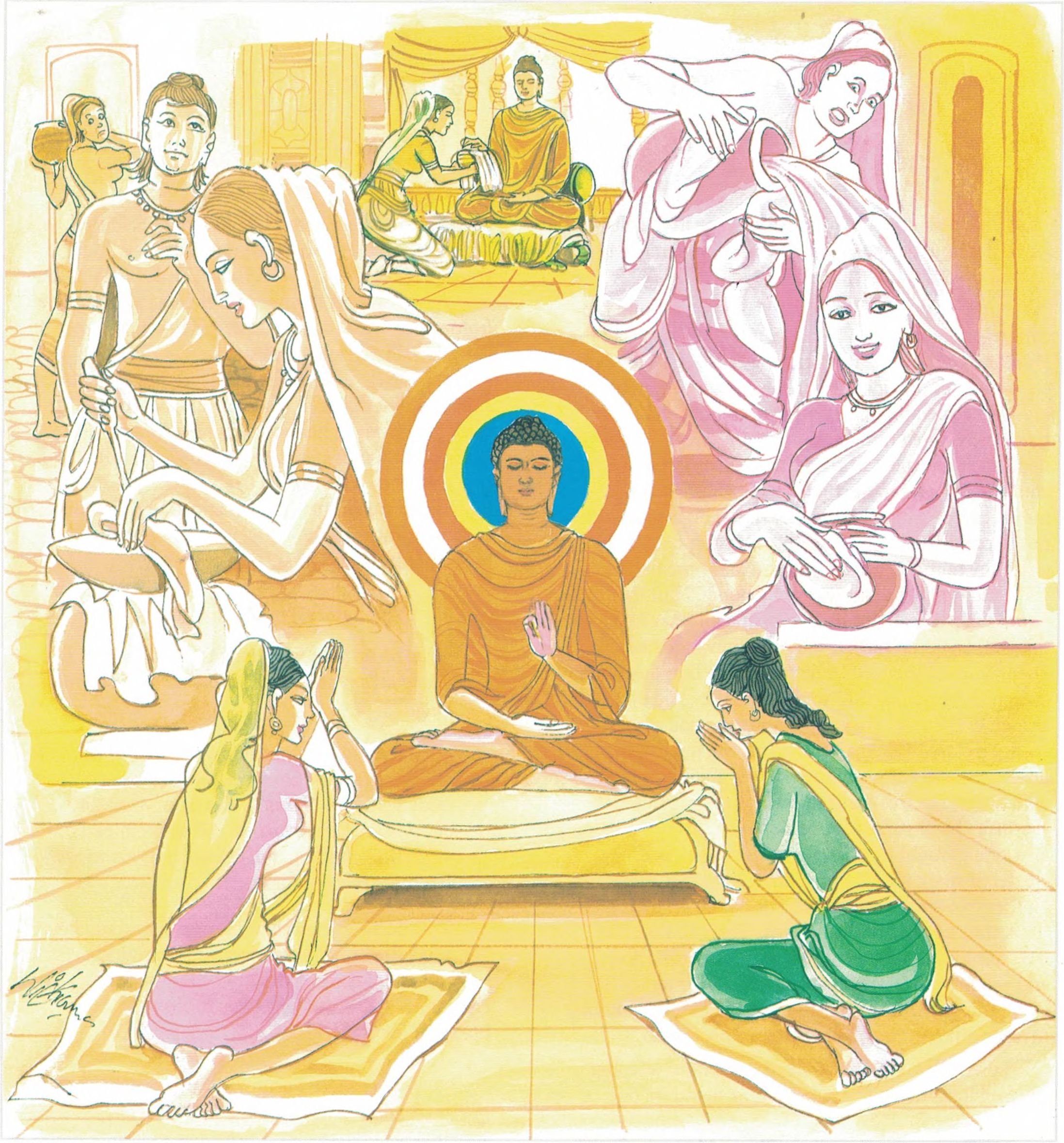Dhammapada (Illustrated)
by Ven. Weagoda Sarada Maha Thero | 1993 | 341,201 words | ISBN-10: 9810049382 | ISBN-13: 9789810049386
This page describes The Story of Uttara the Lay-Disciple which is verse 223 of the English translation of the Dhammapada which forms a part of the Sutta Pitaka of the Buddhist canon of literature. Presenting the fundamental basics of the Buddhist way of life, the Dhammapada is a collection of 423 stanzas. This verse 223 is part of the Kodha Vagga (Anger) and the moral of the story is “Conquer anger with love, evil with good, greed with charity and falsehood with truth”.
Verse 223 - The Story of Uttarā the Lay-Disciple
Pali text, illustration and English translation of Dhammapada verse 223:
akkodhena jine kodhaṃ asādhuṃ sādhunā jine |
jine kadariyaṃ dānena saccena alikavādinaṃ || 223 ||
223. Anger conquer by amity, evil conquer with good, by giving conquer the miserly, with truth the speakers of falsity.
 Conquer anger with love, evil with good, greed with charity and falsehood with truth. |
The Story of Uttarā the Lay-Disciple
While residing at the Veluvana Monastery, the Buddha spoke this verse with reference to Uttarā, a female lay-disciple.
Uttarā was the daughter of a farm labourer named Puñña and his wife. Puñña worked for a rich man named Sumana, in Rājagaha. One day, Puñña and his wife offered alms-food to Venerable Sāriputta soon after his arising from sustained deep mental absorption (nirodha samāpatti), and as a result of that good deed they suddenly became very rich. Puñña came upon gold in the field he was ploughing, and the king officially declared him a royal banker. On one occasion, the family of Puñña offered alms-food to the Buddha and the monks for seven days, and on the seventh day, after hearing the Buddha’s discourse, all the three members of the family attained sotāpatti fruition. Later, Uttarā, the daughter of Puñña, married the son of the rich man Sumana. That family being non-Buddhist, Uttarā did not feel happy in her husband’s home. So, she told her father, “My father, why have you put me in this cage? Here, I do not see any monk and I have no chance to offer anything to any monk.” Her father felt sorry for her and sent her fifteen thousand in cash. With this money, after getting permission from her husband, Uttarā engaged a courtesan to look to the needs of her husband. So it was arranged that Sirimā, a wellknown and very beautiful courtesan, was to take her place as a wife for fifteen days.
During that time, Uttarā offered alms-food to the Buddha and the monks. On the fifteenth day, as she was busy preparing food in the kitchen, her husband saw her from the bedroom window and smiled, and then muttered to himself, “How foolish she is! She does not know how to enjoy herself. She is tiring herself out with this alms-giving ceremony!” Sirimā saw him smile, and forgetting that she was only a paid substitute wife felt very jealous of Uttarā. Being unable to control herself, Sirimā went into the kitchen and got a ladleful of boiling butter with the intention of pouring it over the head of Uttarā. Uttarā saw her coming, but she bore no ill will towards Sirimā. She reflected that because Sirimā had stood in for her, she had been able to listen to the dhamma, make offerings of alms-food for fifteen days, and perform other acts of charity. Thus she was quite thankful to Sirimā. Suddenly, she realized that Sirimā had come very close to her and was going to pour boiling-hot butter over her; so she made this asseveration: “If I bear any ill will towards Sirimā may this boiling-hot butter burn me; if I have no ill will towards her may it not burn me.” The boiling-hot butter did not harm her a bit.
Sirimā then expressed her wish to see the Buddha. So it was arranged that Sirimā should offer alms-food to the Buddha and the monks on the following day at the house of Uttarā. After the meal, the Buddha was told everything that had happened between Sirimā and Uttarā. Sirimā then owned up that she had done wrong to Uttarā and entreated the Buddha that she should be forgiven, for otherwise Uttarā would not forgive her. The Buddha then asked Uttarā how she felt in her mind when Sirimā poured boiling butter on her head, and Uttarā answered, “Venerable, because I owed so much to Sirimā I had resolved not to lose my temper, not to bear any ill will towards her. I sent forth my love towards her.” The Buddha then said, “Well done, well done, Uttarā! By not bearing any ill will you have been able to conquer one who has done you wrong through hate. By not abusing, you should conquer one who is a miser; by speaking the truth you should conquer one who tells lies.”
Explanatory Translation (Verse 223)
kodhaṃ akkodhena jine asādhuṃ sādhunā jine
kadariyaṃ dānena alikavādinaṃ saccena jine
kodhaṃ [kodha]: the angry person; akkodhena: with non-anger; jine: conquer; asādhuṃ [asādhu]: unvirtuous person; sādhunā: with goodness; jine: conquer; kadariyaṃ [kadariya]: the miserly; dānena: through charity (conquer); alikavādinaṃ [alikavādina]: the liar; saccena: by truth; jine: conquer
Let anger be conquered by non-anger. Let bad ones be conquered by good. Let miserliness be overcome by charity. Let the liar be conquered by the truth.
Commentary and exegetical material (Verse 223)
nirodha samāpatti: attainment of the quiescence of cessation. Puñña became exceedingly rich according to this story because he offered alms to Venerable Sāriputta immediately after he arose from nirodha samāpatti (also described as deep mental rest). Cessation of feeling and perception (saññā vedayita nirodha) is the temporary suspension of all consciousness and mental activity.
